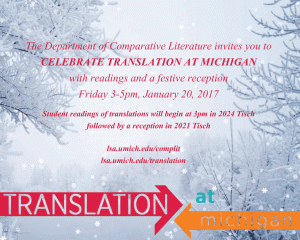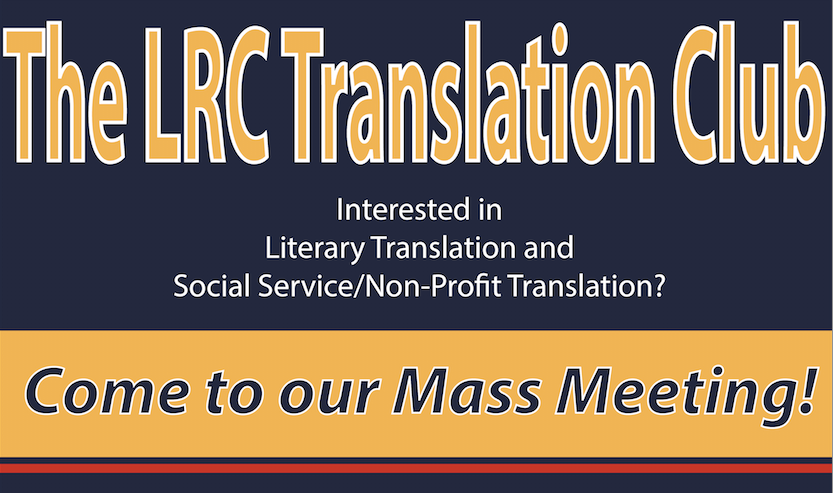Each year, the Department of Comparative Literature puts out its annual call for the Senior Prize in Literary Translation. Since 2011, fourteen seniors from departments across the University have received the honor (and prize money) for their stirring translations. Before we send out this year’s call for submissions, the Department would like to highlight several of those notable texts.
Our first blog in this series showcases the work of Ana Guay ‘15 (BA, Classical Languages & Literatures, minor in Translation Studies). Having graduated with a Minor in Translation Studies, Ana completed a capstone project titled “A Voice Not to Be Broken: Translating the poetic catalogue in and after Homer.” Weaving together her interest in paratexts and translation studies, Ana grappled with the four separate catalogues (from Homer to Virgil) while also exploring the legacy of Homeric translations in English. Ana was awarded the prestigious Gates scholarship to study Classics at Cambridge University in 2015 and is currently pursing a PhD in Classical Studies at UCLA.
The following is an excerpt from Ana’s translation of Augusto Roa Bastos’s novel Thunder Among the Leaves (Spanish, Guaraní):
The mill was closed for cleaning and repairs after the sugar harvest. The stench of boilers filled the heavy and electric December night. All was quiet and still along the river. Neither the water nor the leaves could be heard. The threat of bad times had generated a tense atmosphere, like the black hollow of a bell, in which the silence seemed to sizzle with stifled whispers and secret cracks.
In that silence the music of the accordion rose from the gullies. It was a ubiquitous melody; a frayed one. It would be interrupted and then return to begin again in a different place alongside the rumble of the river. It was a nostalgic and ghostly sound.
“What’s that?” a stranger asked.
“The accordion of Solano,” an old man told him.
“Who?”
“Solano Rojas, the blind ferryman.”
“But don’t they say he died?”
“He did. What plays now is his soul.”
“Aicheyaranga, Solano!” murmured an old woman, crossing herself. The bulk of the sugar mill crouched, unmoving, in the darkness. A dog barked from afar, as if it barked from beneath the earth. Next to the fire, two or three naked children turned over in their mothers’ laps. One of them began, fussily, to whine with fright.
“Hush, my son. Listen to Solano. That’s the custom in El Paso.”
The counterpoint of a potoo, which shattered the hill’s quiet with its birdsong, returned a melody still more ghostly. The accordion sang now with a distant and mournful lament.
“He sounds like that when there’s no moon,” said the old man, lighting his cigar from a firebrand on which a little of the night was burning. “He must walk in search of her still.”
“Poor Solano!”
When the murmur of voices died away, it could be noticed that the ghostly accordion no longer sang in the throat of the river. Only the bell of the jungle kept ringing for a time, at some imprecise distance; afterwards the bird, too, fell silent. The last echoes skimmed over the river. The silence returned to being tense, heavy, dark.
The first flashes of lightning blazed up towards the west, to the right of the jungle. They were like fleeting eyelids of yellowish skin that rose and lowered suddenly over the immense eye of the thunder.
The accordion did not sound again that night in El Paso.














